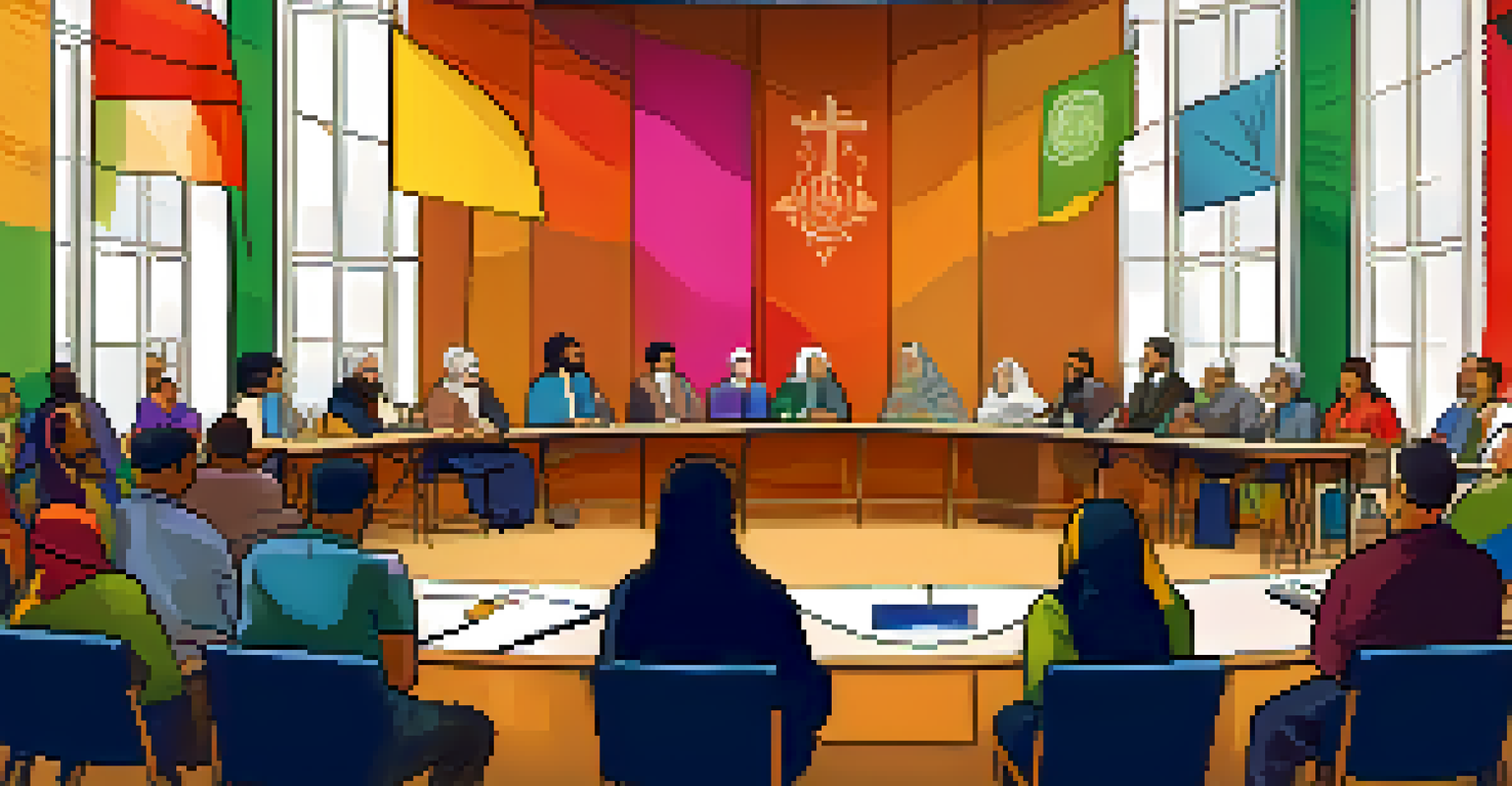Interfaith Dialogues: Bridging Gaps for Social Justice

Understanding Interfaith Dialogues and Their Importance
Interfaith dialogues are conversations between individuals from different religious backgrounds aimed at fostering understanding and respect. These dialogues create a safe space for participants to share their beliefs and values, ultimately breaking down barriers that often lead to misunderstanding and conflict. By engaging in open discussions, faith communities can find common ground and build relationships that transcend their differences.
Peace cannot be kept by force; it can only be achieved by understanding.
The importance of interfaith dialogues goes beyond just fostering good relationships; they play a vital role in addressing social justice issues. When diverse groups come together, they can identify shared concerns—like poverty, discrimination, and environmental issues—that affect their communities. This collaborative approach not only empowers participants but also amplifies their collective voices in advocating for change.
For many, engaging in interfaith dialogues can be a transformative experience. It challenges preconceived notions and stereotypes, encouraging individuals to step outside their comfort zones. As participants share their stories and experiences, they also learn to appreciate the beauty of diversity, which can lead to more inclusive communities and a greater commitment to social justice.
The Role of Empathy in Interfaith Dialogues
Empathy is at the heart of successful interfaith dialogues. It allows participants to genuinely understand and appreciate the perspectives of others, fostering an environment of trust and openness. When individuals listen with empathy, they validate each other's experiences and emotions, which can significantly reduce tension and promote healing.

Moreover, empathy can bridge significant gaps in communication. For instance, when one group shares their struggles, others can relate those experiences to their own challenges, creating a sense of solidarity. This shared understanding often becomes a powerful motivator for collaborative action toward social justice initiatives.
Interfaith Dialogues Foster Unity
Engaging in interfaith dialogues helps break down barriers and build relationships across diverse religious backgrounds.
By cultivating empathy, interfaith dialogues can lead to lasting relationships that extend beyond the conversation. Participants often leave these dialogues with a renewed sense of responsibility to advocate for one another, recognizing that social justice is a shared goal that requires collective effort. This ripple effect can inspire communities to work together toward meaningful change.
Challenges Faced in Interfaith Dialogues
While interfaith dialogues have immense potential, they also come with challenges. One major hurdle is the deeply ingrained biases and stereotypes that participants may hold. Overcoming these barriers requires patience, openness, and a willingness to confront uncomfortable truths about one's own beliefs and assumptions.
In diversity there is beauty and there is strength.
Another challenge is the varying levels of commitment among participants. Some individuals may approach the dialogue with a genuine desire for understanding, while others might be resistant or skeptical. This disparity can create an uneven dynamic, making it difficult to foster productive conversations that lead to actionable outcomes.
Additionally, external factors such as political climate or societal tensions can impact the effectiveness of interfaith dialogues. In moments of heightened conflict, the very act of engaging across faith lines can feel daunting. However, acknowledging these challenges and addressing them head-on can strengthen the dialogue process and ultimately lead to more robust and impactful outcomes.
Successful Examples of Interfaith Dialogues
There are numerous examples of successful interfaith dialogues that have made a significant impact on communities. One notable instance is the Interfaith Youth Core, which brings together young people from various faith traditions to engage in service projects and meaningful discussions. Their initiatives not only promote understanding but also address pressing social issues in local communities.
Another inspiring example is the Parliament of the World's Religions, a global event that convenes representatives from diverse faiths to discuss pressing world issues. Through workshops and panels, participants collaborate on solutions to promote peace, justice, and sustainability. This gathering has become a powerful platform for interfaith dialogue and social justice advocacy.
Empathy Drives Understanding
Empathy is crucial in interfaith dialogues, allowing participants to connect and appreciate each other's experiences.
These examples highlight the potential for interfaith dialogues to create real change. By learning from each other and working collaboratively, communities can tackle social justice issues more effectively. The success of these initiatives demonstrates that interfaith dialogue is not just about conversation; it's about action and making a difference in the world.
The Connection Between Faith and Social Justice
Faith traditions around the world often emphasize social justice as a core principle. Many religious teachings advocate for compassion, equality, and the dignity of all people, providing a strong foundation for interfaith dialogue. By focusing on these shared values, participants can unite in their commitment to social justice and work collaboratively toward common goals.
For example, many faith leaders have taken a stand against systemic injustice and inequality, calling their congregations to action. This shared mission can foster collaboration among different religious groups, amplifying their voices in advocating for social change. When faith communities come together, they can challenge oppressive systems more effectively than when they act alone.
Ultimately, the connection between faith and social justice highlights the importance of interfaith dialogues in today's world. By embracing their shared values and recognizing their collective responsibility, faith communities can become powerful allies in the fight for justice, equality, and peace.
Promoting Interfaith Dialogue in Communities
To foster interfaith dialogue in communities, it's essential to create welcoming spaces where individuals feel safe to share their beliefs and experiences. Community centers, places of worship, and local organizations can serve as venues for these conversations. Hosting events that promote understanding—like panel discussions, workshops, or cultural exchanges—can help raise awareness and encourage participation.
Additionally, education plays a vital role in promoting interfaith dialogue. Incorporating interfaith studies into school curriculums can help young people develop a deeper understanding of different religions and cultures. This early exposure can cultivate empathy and respect, paving the way for more inclusive communities as these individuals grow.
Collective Action for Social Justice
Interfaith dialogues empower communities to collaborate on social justice issues, amplifying their voices for meaningful change.
Finally, leveraging social media and online platforms can significantly broaden the reach of interfaith dialogues. Virtual discussions can connect people from diverse backgrounds, allowing for greater participation and collaboration. By utilizing technology, communities can create a more robust network of support, ultimately advancing the cause of social justice through interfaith engagement.
The Future of Interfaith Dialogues and Social Justice
As the world becomes more interconnected, the future of interfaith dialogues looks promising. With increasing recognition of the importance of collaboration across faith lines, communities are more likely to embrace these conversations as a pathway to social justice. This shift can lead to a greater focus on collective action to address pressing global issues.
Moreover, the rise of social movements that prioritize inclusion and equity has created a fertile ground for interfaith dialogues. These movements often draw on diverse faith perspectives to advocate for change, demonstrating that interfaith collaboration is not only relevant but essential in today's society. This trend highlights the power of unity in addressing systemic injustices.

In conclusion, interfaith dialogues hold immense potential for fostering understanding and promoting social justice. By bridging gaps between different faith communities, we can work together to create a more just and equitable world. The journey toward social justice is ongoing, but with interfaith dialogues as a guiding force, we can take meaningful steps toward a brighter future.